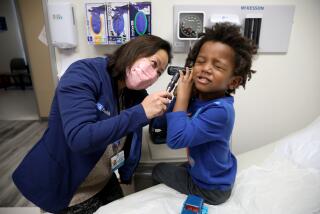Column: California faces a doctor shortage. But doctors just derailed a plan to fix it
State lawmakers had a chance Thursday to vote on ensuring that all Californians get the healthcare they need. Instead of rising to the occasion, they punted.
No, the matter at hand wasn’t a single-payer bill to provide universal coverage, although that would be a good thing too.
Rather, the California Assembly Appropriations Committee decided to put off a vote until next year on a bill that would expand the ability of nurse practitioners to treat patients.
Such a move would go a long way toward addressing a severe shortage of primary-care doctors and would align us with other states that have adopted similar measures.
The legislation — AB 890 — shouldn’t be controversial, but killing or weakening it has become a top priority for the California Medical Assn., doctors’ main trade group.
“The California Medical Assn. has been very successful at pushing this back over many, many years,” said Assemblyman Jim Wood (D-Healdsburg), who is a dentist and the author of AB 890. “They’ve been organizing their doctors and lobbying heavily against it.”
He told me he’s tried to work with the group to craft legislation that addresses their concerns. But the talks haven’t been productive.
Wood said he met in February with the association’s top brass and asked for evidence — studies, surveys, whatever — showing why expanding the scope of nurse practitioners’ medical capabilities is a bad idea.
“I’m still waiting,” Wood said. “They haven’t produced anything.”
Maybe that’s because all the doctors have are vague warnings about creation of a two-tier healthcare system in which wealthier Californians are treated by highly trained physicians and everyone else has to settle for nurse practitioners, which the medical association suggests would be a risk to life and limb.
That’s just hooey.
“The only tiers are care and no care,” said Karen Bradley, president of the California Assn. for Nurse Practitioners. “We’re not trying to replace doctors. We’re part of the same team.”
As I’ve previously noted, a nurse practitioner falls between a doctor and a registered nurse. She or he must have at least a master’s degree and must receive advanced training in a specialty, such as family medicine.
Unlike an ordinary nurse, a nurse practitioner can order tests, diagnose medical problems and manage a patient’s overall care. A nurse practitioner mostly focuses on wellness. More complicated issues are referred to a doctor.
At the moment, California requires that nurse practitioners be supervised by a physician, particularly if they want to prescribe drugs for patients.
The supervising physician is seldom in the exam room. He or she could in fact be miles away and may be in touch with the nurse practitioner only on an occasional basis.
We’re one of about two dozen states that still require such supervision, and the only one in the West to do so. AB 890 aims to fix this.
Among other things, it would eliminate the need for a doctor’s oversight after a supervised training period and would allow a nurse practitioner to, for example, prescribe insulin for someone with diabetes or cholesterol medication for someone at risk of heart disease.
This is a big deal because California will be short about 4,100 primary-care doctors by 2030, according to a recent report from the California Future Health Workforce Commission, a blue-ribbon panel co-chaired by University of California President Janet Napolitano and Lloyd Dean, chief executive of Dignity Health.
The commission’s recommendations included boosting the number of nurse practitioners statewide “and providing them with greater practice authority, with particular emphasis in rural and urban underserved communities.”
By 2028, it said, greater use of nurse practitioners would result in more than $500 million in savings through reduced hospital visits.
However, the California Medical Assn. says the bill “would remove critical patient protections” and allow nurse practitioners to practice medicine “without completing the necessary education and training” required for doctors.
The group also says the bill “will not achieve expanded access to care, maintain patient safety or promote affordability of care.”
These are bogus claims.
AB 890 would establish an Advanced Practice Registered Nursing Board within the state Department of Consumer Affairs to oversee nurse practitioners. They wouldn’t be loose cannons.
Of course, nurse practitioners wouldn’t have the same education and training as doctors. If they did, they’d be doctors.
Instead, they’d continue receiving the postgraduate education, training and certification necessary to be nurse practitioners.
It goes without saying that an increase in the number of nurse practitioners would expand access to care and promote affordability of care. How could it not?
Is the medical association’s real issue here that the current system requires some nurse practitioners to pay physicians to serve as their supervisors, and that AB 890 thus represents a potential loss of revenue?
Are doctors worried that nurse practitioners, who are paid less for their skills than doctors, will prompt some people to wonder if they’re being overcharged by physicians for routine exams?
Or is the doctors’ opposition rooted in something as petty as having their status as primary caregivers threatened by well-trained colleagues who just want to address a crucial need for medical professionals?
Janus Norman, who oversees legislative matters for the California Medical Assn., dismissed such speculation as “red herrings.”
He told me the only issue for doctors is ensuring that nurse practitioners are sufficiently experienced and monitored to guarantee high-quality care. “We’re interested in protecting the patients of California,” he said.
I asked if he could cite any documented evidence of malpractice from the 28 states, plus the District of Columbia, that have granted more independence to nurse practitioners.
Norman said he had no such data. But he said his group is aware of “massive” anecdotal evidence from doctors in other states about inappropriate referrals and unnecessary testing by nurse practitioners.
That’s not very impressive.
In fact, a 2017 study found that instances of malpractice were far higher for physicians than for nurse practitioners. A 2018 study found that when nurse practitioners are given more authority to practice and prescribe, overall malpractice costs drop for all medical professionals.
Wood, the bill’s author, said if there was proof that giving nurse practitioners greater independence is potentially harmful to the public, critics such as the doctors group would have it at their fingertips.
“They have nothing,” he said.
What they do have is plenty of funding and political clout.
Unfortunately, that won’t change when AB 890 returns in the future.
David Lazarus’ column runs Tuesdays and Fridays. He also can be seen daily on KTLA-TV Channel 5 and followed on Twitter @Davidlaz. Send your tips or feedback to david.lazarus@latimes.com.







